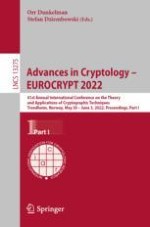2022 | OriginalPaper | Buchkapitel
High-Precision Bootstrapping for Approximate Homomorphic Encryption by Error Variance Minimization
verfasst von : Yongwoo Lee, Joon-Woo Lee, Young-Sik Kim, Yongjune Kim, Jong-Seon No, HyungChul Kang
Erschienen in: Advances in Cryptology – EUROCRYPT 2022
Aktivieren Sie unsere intelligente Suche, um passende Fachinhalte oder Patente zu finden.
Wählen Sie Textabschnitte aus um mit Künstlicher Intelligenz passenden Patente zu finden. powered by
Markieren Sie Textabschnitte, um KI-gestützt weitere passende Inhalte zu finden. powered by
